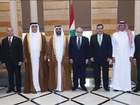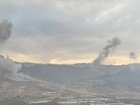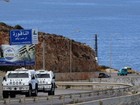Prime Minister Nawaf Salam noted Monday that “Lebanon’s stability is not only a Lebanese need but also a joint Arab need,” stressing that the government “will carry on with the implementation of its decisions as to the monopolization of arms in the hands of the state across Lebanon.”
“After it returned to its natural position among its Arab brothers, Lebanon needs boosting support for the Lebanese Army, seeing as it is the main pillar for protecting the country,” Salam added.
 Full Story
Full Story
Israel has asked through the U.S. that the Lebanese Army begins its disarmament plan from the Baalbek and Hermel regions, claiming that they are “a hub for advanced missiles and drones,” an informed source said.
Israel submitted to the U.S.-led ceasefire committee “dozens of coordinates to be submitted to the army for inspection,” the source told the pro-Hezbollah al-Akhbar newspaper in remarks published Monday.
 Full Story
Full Story
U.S. envoy Morgan Ortagus and U.S. Central Command chief Admiral Brad Cooper heard Sunday from Lebanon’s representative in the ceasefire committee a detailed briefing about the Lebanese Army’s plan for arms monopolization and what has been achieved until the moment, informed sources said.
 Full Story
Full Story
Hezbollah MP Ali Fayyad said Monday that the Israeli withdrawal should be the priority and not Hezbollah's disarmament, adding that "unbiased polls have showed that the majority of the Lebanese people reject the government's decision (to disarm Hezbollah)."
Fayyad assured that the army, which was tasked with the disarmament plan, won't be dragged into a conflict with Hezbollah. "The Lebanese army is keen on maintaining unity and peace," he said.
 Full Story
Full Story
Lebanese Forces leader Samir Geagea has told Hezbollah that its problem will not be with a party but rather with the state and the army, if it insists on keeping its arms.
"We will no longer accept non-Lebanese decisions or allow one group to control the fate of the Lebanese people. Lebanon comes first, above all else," the christian leader said, days after Cabinet approved a plan prepared by the army to monopolize weapons in the war-hit country.
 Full Story
Full Story
U.S. President Donald Trump has responded to a Lebanese reporter’s question about Hezbollah’s perceived refusal to turn in its weapons to the Lebanese state.
 Full Story
Full Story
Prominent Lebanese journalist and talk show host Walid Abboud on Monday received threats to his life through a number of flyers that were thrown around his house in Keserwan.
 Full Story
Full Story
A wave of Israeli airstrikes on Monday targeted several mountainous areas in the Baalbek-Hermel region, killing five people and wounding five others, the Health Ministry said.
A Hezbollah official, speaking on condition of anonymity because they were not authorized to speak to the press, confirmed four of the five killed were group members.
 Full Story
Full Story
Speaker Nabih Berri met with President Joseph Aoun on Monday at the Baabda Palace.
“With the blessings of the Virgin Mary, everything is good,” Berri told reporters as he left the palace.
 Full Story
Full Story
The U.S.-led ceasefire monitoring committee convened Sunday in Ras al-Naqoura in the presence of U.S. envoy Morgan Ortagus and U.S. Central Command chief Admiral Brad Cooper.
 Full Story
Full Story



